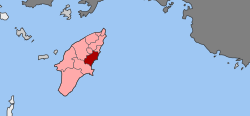Archangelos, Rhodes
|
Archangelos Αρχάγγελος |
|
|---|---|
 |
|
| Coordinates: 36°13′N 28°07′E / 36.217°N 28.117°ECoordinates: 36°13′N 28°07′E / 36.217°N 28.117°E | |
| Country | Greece |
| Administrative region | South Aegean |
| Regional unit | Rhodes |
| Municipality | Rhodes |
| • Municipal unit | 115.4 km2 (44.6 sq mi) |
| Elevation | 154 m (505 ft) |
| Population (2011) | |
| • Municipal unit | 7,615 |
| • Municipal unit density | 66/km2 (170/sq mi) |
| Community | |
| • Population | 5,476 (2011) |
| Time zone | EET (UTC+2) |
| • Summer (DST) | EEST (UTC+3) |
Archangelos (Greek: Αρχάγγελος) is a town and a former municipality on the island of Rhodes, in the Dodecanese, Greece. Since the 2011 local government reform it is part of the municipality Rhodes, of which it is a municipal unit.
Archangelos is located about 30 kilometers south of the town of Rhodes on the island's east coast at an elevation of 160 meters. Its population according to the 2011 census was 5,384 making it the fifth largest town of the island (after the capital Rhodes, and the town of Trianta (Ialysos), Kremasti and Afantou. The town's name derives from Archangel Michael who is also considered its patron.
The municipal unit of Archangelos has a land area of 115.375 km², and includes several other towns, the largest of which are Malónas (pop. 982) and Másari (1,004). Its total population was 7,615 at the 2011 census.
Numerous small settlements existed in the broader area of Archangelos during the Hellenistic era, others on the coast and others inland. After the 7th century AD the settlements near the coast were abandoned due to the frequent invasions of pirates and their inhabitants settled on existing inland settlements or founded new ones in more secure areas. Over time the various settlements of the area were merged in one forming the town of Archangelos.
After the fall of Constantinople in 1453, the Knights Hospitaller who were occupying the island of Rhodes since 1309, built a fortress (some sort of an Acropolis) on top of one of the town's nearby hills to protect from a possible Ottoman invasion on the island. Ruins of this (castle of Saint John) fortress remain today.
...
Wikipedia


